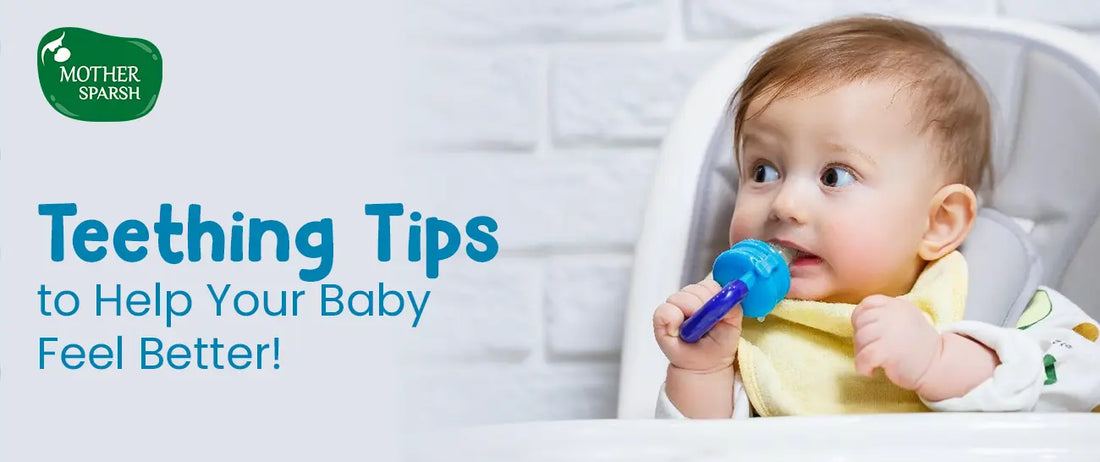
Soothing Your Baby’s Teething Pain: Essential Tips for Parents
As your baby’s first teeth begin to emerge, you may experience sleepless nights and fussy days. But don’t worry—you’re not alone in this journey. With a little care and the right methods, you can ease your baby’s discomfort. We’ve gathered helpful tips, from gentle home remedies to soothing teething toys, to bring back those joyful smiles. So, relax, grab a cozy blanket, and let’s make teething a more peaceful time for both you and your baby
Table of Contents
Understanding Baby Teething and Its Symptoms
The Teething Timeline
Teething is an important milestone in your baby’s growth. It typically begins between 4 to 7 months of age and continues until they’re around 3 years old. During this phase, their tiny teeth start to emerge through the gums, which can often cause discomfort. Understanding what to expect can help you better support your baby through this challenging time.
Signs Your Baby Is Teething
Look out for these common teething signs:
- Increased fussiness and irritability
- Swollen, red gums
- Excessive drooling
- Chewing or biting on objects
- Disrupted sleep patterns
- Decreased appetite
Teething symptoms vary from baby to baby. Some babies may experience little to no discomfort, while others may show more pronounced signs. Every baby's teething experience is unique.
When to Seek Help
Most teething discomfort can be managed at home, but you should consult your doctor if your baby develops a persistent fever, becomes unusually irritable, or shows other concerning symptoms. Your doctor can recommend safe teething remedies and ensure your baby stays healthy and comfortable during this important phase of growth.

Top Tips to Soothe Your Baby’s Teething Pain
Teething can be a challenging time for babies and parents. Here are some gentle and effective ways to help your baby through it:
1. Teething Toys
Offer your baby safe, chewable toys made of silicone or rubber. These soft toys gently massage the gums, helping to relieve pressure and soothe discomfort.
2. Cool Compresses
Place teething toys in the refrigerator to cool them. The cold can help numb your baby's gums, providing soothing relief and reducing swelling.
3. Cold Washcloth
You can also use a clean, cold washcloth or a frozen cucumber slice to comfort your child. The cold sensation helps reduce swelling and can be very calming.
4. Gum Massage
Use a clean finger to massage your baby's gums gently. This can relieve pressure and works for babies as young as 4 months.
5. Natural Soothing
Consider Mother Sparsh Gripe Water infused with relieving properties of saunf and ajwain. Many parents find it helpful in easing teething discomfort. Always check with your doctor before introducing any new product.
Also Read:
Bubbles and Bliss: A New Parent’s Guide to Baby Bath Essentials
Since each baby is unique, you may need to try a few methods to see what provides the most relief. These strategies can make teething easier for your little one with patience and care.

Helping Babies Sleep Peacefully During Teething
Teething can make it difficult for both babies and parents to get a restful night’s sleep. Here are some tips to help your baby relax and sleep more peacefully during this time.
1. Establish a Soothing Bedtime Routine
- Consistency: A consistent bedtime routine can help your baby relax, even during teething discomfort. Consider a soothing pre-sleep ritual like a warm bath, gentle massage, or a quiet story to help them wind down.
- Calming Cues: These activities signal to your baby that it's bedtime, helping them relax even if they're uncomfortable.
2. Create a Comforting Sleep Environment
- Peaceful Atmosphere: Use soft lighting, play gentle lullabies or white noise, and keep the room at a comfortable temperature.
- Humidifier: A cool-mist humidifier can help soothe sensitive gums by maintaining moisture in the air, creating a calm and comfortable sleep environment for your baby.
3. Nighttime Pain Relief Options
- Gentle Massage: Before bed, gently massage your baby’s gums with a clean finger or offer a chilled (but not frozen) teething ring to help relieve pain.
- Consult a Doctor: For persistent discomfort, ask your doctor about safe pain relief options suitable for nighttime. Ensuring a comfortable, restful night’s sleep can make a significant difference for both your baby and your household.
Always Remember
Teething is a natural part of your baby’s growth, and while it can be challenging, there are plenty of ways to make it easier. With these soothing techniques, you can help your little one navigate this phase more comfortably, transforming tough moments into chances for extra love and care.
FAQs
Que: What are the common signs that my baby is teething?
Ans: When babies start teething, you might notice a few telltale signs. They may become fussier, chew on things a lot, drool excessively, and sometimes even have disrupted sleep. Red, swollen gums are another indicator, and some babies may lose a bit of their appetite due to the discomfort.
Que: When does teething usually begin in babies?
Ans: Teething typically starts between 4 to 7 months, though every baby is different. The process continues until around 3 years of age as all their baby teeth come in. So, it’s a long journey, but it becomes easier as they adjust.
Que: Are teething toys effective for relieving discomfort?
Ans: Yes, teething toys can be very helpful! Soft, chewable toys made of safe materials like silicone or rubber gently massage the gums and relieve pressure. Some babies find this really soothing. You can even cool these toys in the refrigerator for extra relief.
Que: Are there any home remedies to ease my baby's teething pain?
Ans: Absolutely! There are several gentle ways to help ease teething pain. A cool washcloth or a frozen cucumber slice can be comforting because the cold numbs the gums a bit. You can also massage their gums with a clean finger, which is especially good for younger babies. Some parents also find relief using natural products like gripe water, but it’s best to check with your doctor before trying anything new.
Que: Can a cold cucumber slice help with teething pain?
Ans: Yes! A cold cucumber slice can be a simple, natural way to soothe teething pain. Just make sure it’s big enough to prevent choking, and let your baby chew on it. The cold can help numb the pain, and the soft texture is gentle on their gums.





